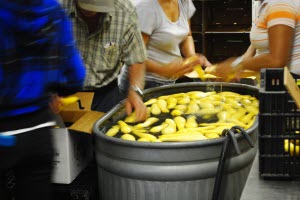UMass Extension to Assist Farms with New Food Safety Rules
“Farmers have many questions about what the new federal law requires of them, and how that will play out when the law is enforced at the state level," specialist says
 Lisa McKeagPhoto courtesy of the University of Massachusetts AmherstAMHERST, Mass. – Lisa McKeag, a UMass Extension vegetable education specialist, has received a two-year, $144,617 grant from the U.S. Department of Agriculture’s National Institute of Food and Agriculture’s (NIFA) Food Safety Outreach Program to promote food safety education, training, and technical assistance for owners and operators of small- to mid-sized farms, farmers’ markets, and others who must deal with recent new federal food safety guidelines.
Lisa McKeagPhoto courtesy of the University of Massachusetts AmherstAMHERST, Mass. – Lisa McKeag, a UMass Extension vegetable education specialist, has received a two-year, $144,617 grant from the U.S. Department of Agriculture’s National Institute of Food and Agriculture’s (NIFA) Food Safety Outreach Program to promote food safety education, training, and technical assistance for owners and operators of small- to mid-sized farms, farmers’ markets, and others who must deal with recent new federal food safety guidelines.
NIFA’s $4.7 million national program announced in October intends to also help beginning farmers, socially-disadvantaged farmers, small processors, and small fresh fruit and vegetable wholesalers to meet challenges that may come with new guidelines established by the Food and Drug Administration under the Food Safety Modernization Act (FSMA).
McKeag says she will be adapting current UMass training materials to address requirements for FSMA’s produce rule, which specifically deals with safe growing, harvesting, packing, and holding fruits and vegetables. She will work with agriculture organizations across Massachusetts to provide training, research-based on-the-farm workshops and other outreach to respond to and meet produce growers’ needs.
While participation is voluntary, programs such as the USDA’s Good Agricultural Practices (GAP) certification or the Massachusetts Commonwealth Quality Program require farmers to show that they are using certain best practices to minimize the risks of microbial contamination. FSMA now mandates these practices for farms of certain sizes that grow produce that may be eaten raw.
McKeag says, “Farmers have many questions about what the new federal law requires of them, and how that will play out when the law is enforced at the state level. Many small operations may be technically exempt from most of the requirements of FSMA, but growers are interested in training and new practices and tools that are appropriate for the scale of agriculture we have in Massachusetts so that they can meet the demands of their buyers, improve their efficiency and, above all, produce safe food.”
“My goals are to be available as a resource and connect farmers with the information that they need, and to identify under-served populations who might need assistance in getting up to speed. We hope with this project to get the same accurate information to educators across the state to ease the transition for farmers into this new regulatory environment,” she adds.
 Programs such as the USDA’s Good Agricultural Practices certification or the Massachusetts Commonwealth Quality Program require farmers to show that they are using certain best practices to minimize the risks of microbial contamination.Photo courtesy of the University of Massachusetts AmherstShe plans to collaborate with several farmer advocacy and educational service organizations around the state to expand the audience for GAP education. McKeag will establish communication between UMass Extension and the Northeast Regional Center to Advance Food Safety, adapt training materials to new FSMA requirements, update UMass Extension Food Safety for Farmers website, design and offer an online training course, hold certification trainings and practical workshops on key food safety focus areas, assess impacts of these outreach efforts and report results.
Programs such as the USDA’s Good Agricultural Practices certification or the Massachusetts Commonwealth Quality Program require farmers to show that they are using certain best practices to minimize the risks of microbial contamination.Photo courtesy of the University of Massachusetts AmherstShe plans to collaborate with several farmer advocacy and educational service organizations around the state to expand the audience for GAP education. McKeag will establish communication between UMass Extension and the Northeast Regional Center to Advance Food Safety, adapt training materials to new FSMA requirements, update UMass Extension Food Safety for Farmers website, design and offer an online training course, hold certification trainings and practical workshops on key food safety focus areas, assess impacts of these outreach efforts and report results.
NIFA director Sonny Ramaswamy says, “Providing food safety training for small farm owners and food processors is critically important to the health of consumers. Outreach, training and technical support are essential to the successful implementation of the Food Safety Modernization Act.”
USDA says industry data suggests that U.S. local food sales totaled at least $12 billion in 2014, up from $5 billion in 2008. NIFA says its support for the best and brightest scientists and extension personnel has resulted in user-inspired, groundbreaking discoveries that are combating childhood obesity, improving and sustaining rural economic growth, addressing water availability issues, increasing food production, finding new sources of energy, mitigating climate variability, and ensuring food safety.
To learn about upcoming training opportunities or with questions about farm food safety and FSMA, contact Lisa McKeag at 413/577-3976 or lmckeag@umass.edu
